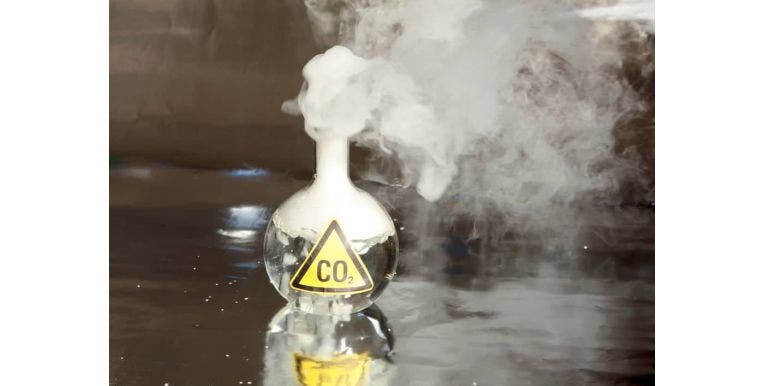What is CO2? Exploring the Laboratory Uses of Carbon Dioxide
Carbon dioxide (CO2) is a fundamental parameter with significant implications within laboratories. Its precise measurement is crucial for many research domains, from environmental sciences to biological studies.
CO2 levels impact everything from cell culture conditions to greenhouse gas research. Accurate monitoring helps maintain optimal conditions for experiments, ensuring reliable results and safeguarding the health of researchers.
This blog will help you understand what is CO2? Why is it crucial in laboratories, and how can we measure it?
What is CO2?
The answer to the question, what is CO2? is known to everyone. CO2 is a chemical compound comprising one carbon atom and two oxygen atoms.
It is a part of Earth's natural carbon cycle. It's released into the atmosphere through various natural processes, such as volcanic eruptions, respiration by living organisms, and decay.
Uses of Carbon Dioxide in Laboratories
Carbon dioxide (CO2) has a variety of applications in laboratories due to its unique chemical and physical properties. Its versatility makes it a valuable tool for performing various experiments and processes.
These are some common uses of carbon dioxide in labs:
Solvent and Extraction Agent
Supercritical CO2 is used as a solvent for extracting various compounds from natural products, such as essential oils, flavors, and fragrances. It offers the advantage of being a non-toxic and non-flammable alternative to traditional organic solvents.
Refrigerant
CO2 is used as a refrigerant in lab equipment like ultra-low temperature freezers, refrigerators, and incubators. It provides efficient cooling while being more environmentally friendly than other refrigerants.
pH Regulation
What is Co2's most essential role in labs? It is ph regulation.
In various biological and chemical experiments, CO2 is used in buffering solutions to regulate pH levels. The presence of dissolved CO2 can help maintain a stable pH range.
Carbon Source for Microbial Growth
In microbiology and biotechnology labs, CO2 is supplied to cultures of microorganisms to promote their growth. It's an essential component of cell culture incubators.
Dry Ice
Solid CO2, commonly known as dry ice, is used for temperature-sensitive reactions and as a cooling agent. It sublimates at a low temperature, providing a controlled and consistent cooling effect.
Carbon Source in Photosynthesis Studies
In plant biology research, CO2 is introduced into growth chambers or growth environments to study the effects of varying CO2 concentrations on photosynthesis, plant growth, and development.
Fire Suppression
In some laboratories, CO2 is used in Lab Safety Equipments as a fire suppression agent. It displaces oxygen, effectively smothering fires and preventing them from spreading.
Gas Chromatography
Chromatography is a technique that separates complex mixtures of compounds. CO2 is used as a carrier gas in gas chromatography. Its inert nature ensures that it doesn't react with the sample components.
Cryopreservation
Cryopreservation, a process involving freezing biological samples for extended storage, utilizes CO2 and other cryoprotectants to safeguard cellular structures.
So, what is CO2? It's a pivotal component in this technique, contributing to the preservation of delicate samples and facilitating future research endeavors.
Calibration of Instruments
O2 is used to calibrate various analytical instruments, including gas analyzers, sensors, and detectors that measure CO2 concentrations.
These are just a few examples of how CO2 is utilized in laboratories. Its properties, such as being non-flammable, readily available, and relatively safe to handle, make it a versatile resource for researchers across diverse scientific disciplines.
Measuring CO2 Lab Values
CO2 lab values provide crucial insights into environmental, biological, and industrial processes, influencing research directions and informing sustainable practices. Lab instruments designed to measure carbon dioxide levels play a critical role in experimentation and research.
Let's delve into the features and benefits of CO2 measuring instruments:
CO2 Loggers
CO2 loggers, also known as CO2 data loggers or CO2 monitors, are specialized devices that measure and record the concentration of carbon dioxide in a specific environment over time. These instruments are essential for tracking changes in CO2 levels, which are crucial indicators of environmental conditions, indoor air quality, and biological processes.
Non-Dispersive Infrared (NDIR) Gas Analyzers
NDIR analyzers are the most widely used instruments for measuring CO2 levels. They work by passing infrared light through a sample gas containing CO2 and measuring the absorption of specific wavelengths. The degree of absorption is proportional to the Co2 concentration in the sample.
Chemical Absorption Methods
Chemical absorption methods involve passing the gas sample through a solution that reacts with CO2 to form a compound that can be quantified. For instance, the "Burette Method" uses a sodium hydroxide (NaOH) solution to capture CO2, and the decrease in the volume of the solution can be used to calculate the CO2 concentration.
Gas Chromatography
Gas chromatography measures CO2 levels in a laboratory. It involves separating different gasses in a sample and quantifying their concentrations. However, gas chromatography might be more complex and time-consuming compared to NDIR analyzers.
Infrared Gas Sensors
These are smaller, more portable devices that use infrared light sources to measure the Co2 concentration. They are commonly used in indoor air quality monitoring.
Carbon dioxide (CO2) is a crucial element with significance in laboratory research. Its measurement is crucial, not only for environmental monitoring but also for an array of scientific investigations. CO2 measuring instruments have made it easier to measure CO2 for various experiments.
To elevate your research and diagnostics, get lab equipment from Westlab Canada that ensures accurate measurements and reliable results. Explore our comprehensive range of CO2 monitoring instruments, such as logger sensors, and dive into the world of CO2 measurement.
Visit the Westlab website and enhance your laboratory's capabilities today!


